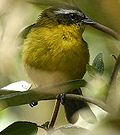Thlypopsis
Appearance
| Thlypopsis | |
|---|---|

| |
| Rufous-chested tanager (above); and buff-bellied tanager (below); illustration by Joseph Smit, 1886 | |
| Scientific classification | |
| Domain: | Eukaryota |
| Kingdom: | Animalia |
| Phylum: | Chordata |
| Class: | Aves |
| Order: | Passeriformes |
| Family: | Thraupidae |
| Genus: | Thlypopsis Cabanis, 1851 |
| Type species | |
| Nemosia fulvescens[1] = Nemosia sordida Strickland, 1844
| |
| Species | |
|
See text | |
Thlypopsis is a genus of birds in the tanager family Thraupidae.
Taxonomy and species list
[edit]The genus Thlypopsis was introduced by the German ornithologists Jean Cabanis in 1851.[2] The name combines the Ancient Greek thlupis, a word for an unknown small bird, and opsis meaning "appearance".[3] The type species was subsequently designated as the orange-headed tanager (Thlypopsis sordida).[4][5]
The chestnut-headed tanager was formerly placed in the genus Pyrrhocoma and the superciliaried hemispingus in Hemispingus. A molecular phylogenetic study published in 2014 found that these two species were embedded in Thlypopsis.[6]
The genus contains eight species:[7]
| Image | Scientific name | Common Name | Distribution |
|---|---|---|---|
 |
Thlypopsis fulviceps | Fulvous-headed tanager | Venezuelan Coastal Range and far northern Colombia. |
 |
Thlypopsis inornata | Buff-bellied tanager | Peru and far southern Ecuador |
 |
Thlypopsis sordida | Orange-headed tanager | Argentina, Bolivia, Brazil, Colombia, Ecuador, Paraguay, Peru, and Venezuela. |
 |
Thlypopsis pyrrhocoma (formerly assigned to Pyrrhocoma) | Chestnut-headed tanager |
east Paraguay, northeast Argentina, and south Brazil |
 |
Thlypopsis ruficeps | Rust-and-yellow tanager | Argentina, Bolivia, and Peru |
 |
Thlypopsis superciliaris (formerly assigned to Hemispingus) | Superciliaried hemispingus | Bolivia, Colombia, Ecuador, Peru, and Venezuela |
 |
Thlypopsis ornata | Rufous-chested tanager | Ecuador, Peru and southwestern Colombia |
 |
Thlypopsis pectoralis | Brown-flanked tanager | Peru |
References
[edit]- ^ "Thraupidae". aviansystematics.org. The Trust for Avian Systematics. Retrieved 2023-07-16.
- ^ Cabanis, Jean; Heine, Ferdinand (1860). Museum Heineanum : Verzeichniss der ornithologischen Sammlung des Oberamtmann Ferdinand Heine, auf Gut St. Burchard vor Halberstadt (in German). Vol. 1. Halberstadt: R. Frantz. p. 138.
- ^ Jobling, James A. (2010). The Helm Dictionary of Scientific Bird Names. London: Christopher Helm. p. 384. ISBN 978-1-4081-2501-4.
- ^ Gray, George Robert (1855). Catalogue of the Genera and Subgenera of Birds Contained in the British Museum. London: British Museum. p. 74.
- ^ Paynter, Raymond A. Jr, ed. (1970). Check-List of Birds of the World. Vol. 13. Cambridge, Massachusetts: Museum of Comparative Zoology. p. 268.
- ^ Burns, K.J.; Shultz, A.J.; Title, P.O.; Mason, N.A.; Barker, F.K.; Klicka, J.; Lanyon, S.M.; Lovette, I.J. (2014). "Phylogenetics and diversification of tanagers (Passeriformes: Thraupidae), the largest radiation of Neotropical songbirds". Molecular Phylogenetics and Evolution. 75: 41–77. Bibcode:2014MolPE..75...41B. doi:10.1016/j.ympev.2014.02.006. PMID 24583021.
- ^ Gill, Frank; Donsker, David; Rasmussen, Pamela, eds. (July 2020). "Tanagers and allies". IOC World Bird List Version 10.2. International Ornithologists' Union. Retrieved 17 October 2020.
